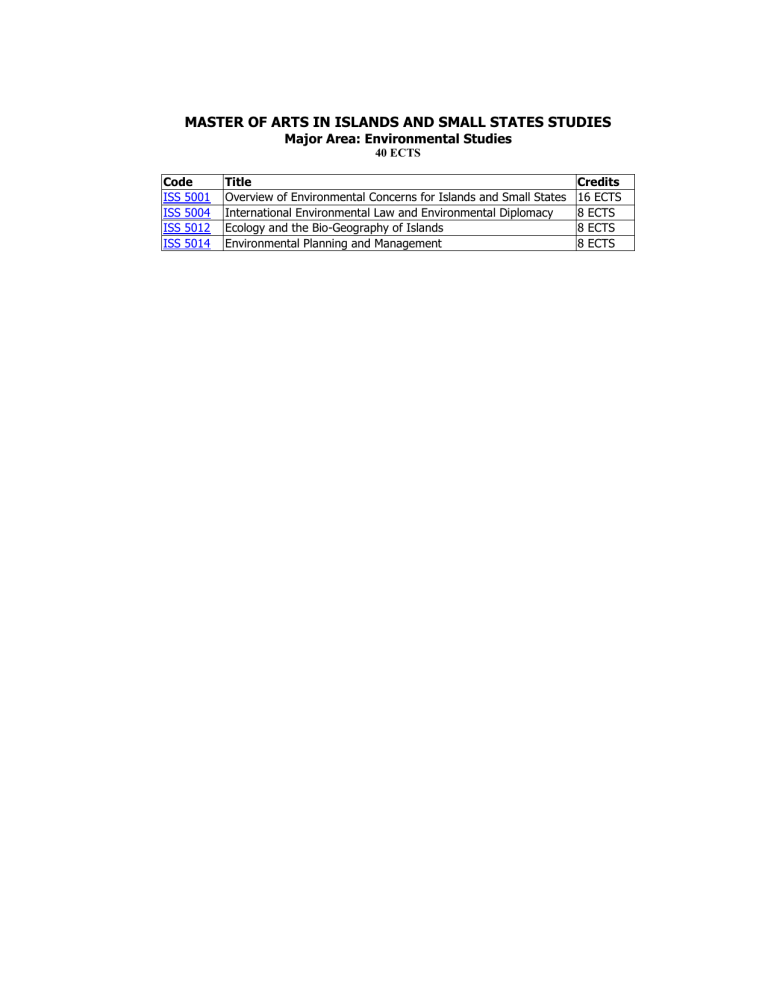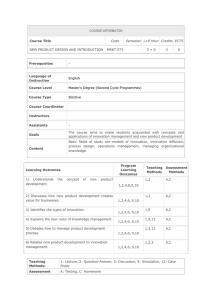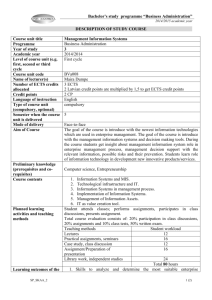MASTER OF ARTS IN ISLANDS AND SMALL STATES STUDIES

MASTER OF ARTS IN ISLANDS AND SMALL STATES STUDIES
Major Area: Environmental Studies
40 ECTS
Code Title Credits
ISS 5001 Overview of Environmental Concerns for Islands and Small States 16 ECTS
ISS 5004 International Environmental Law and Environmental Diplomacy 8 ECTS
ISS 5012 Ecology and the Bio-Geography of Islands 8 ECTS
ISS 5014 Environmental Planning and Management 8 ECTS
STUDY UNIT CODE: ISS 5001
OVERVIEW OF ENVIRONMENTAL CONCERNS FOR ISLANDS AND SMALL STATES
Lecturers: Prof. Victor Axiak/Dr Sandro Lanfranco
Credits Assigned: 16 ECTS
Semester: First Semester
Method of Assessment:
• Course work assignments with a weighting of 30%
• Written examination with a weighting of 70%
Course Work Assignments : As course work, students will be expected to respond to 8 assignments set by the lecturer/s or tutor/s, by writing 8 essays (minimum 2000 words each) on subjects related to the main themes of study unit.
Course Description:
This study unit introduces the student to the most important environmental concerns of islands and small states as identified in the Programme of Action for the Sustainable Development of Small
Island States. The topics to be covered include:
Background: From Barbados to Mauritius
• Climate change
• Waste management
•
Water resources,
•
Coastal zone ,
•
Conservation,
•
Spatial planning,
•
Agriculture and fisheries,
•
Mineral resources,
• Alternative energy,
• Nature conservation,
• Pollution
• Sustainable Tourism
Reading:
UNITED NATIONS, (1994). Programme of Action for the Sustainable Development of Small Island
Developing States (can be accessed from http://www.sidsnet.org/sidsdocs/impdocs.html
)
UNITED NATIONS, (2005). Report on the Mauritius International Meeting on the 10-Yeqar Review of the Programme of Action for the Sustainable Development of Small Island Developing States
(can be accessed from http://www.sidsnet.org/docshare/other/20050622163242_English.pdf
)
BELLER, W., D’AYALA, P. AND HEIN, P., (1990). Sustainable Development and Environmental
Management of Small Islands. UNESCO and Parthenon Publishing Group
BRIGUGLIO, L., (ed) (1999). Waste Management in Small Island Developing States. Malta: Islands and Small States Institute, on behalf of UNEP.
CONLIN, MICHAEL V. AND BAUM T., eds., (1995). Island Tourism Management Principles and
Practice, John Wiley and Sons,
IPCC, (2001).
Vulnerability and Adaptation to Climate Change, Cambridge University Press (can be accessed from http://www.grida.no/climate/ipcc_tar/wg2/619.htm)
KAY, R. and ADLER, J., (1999). Coastal Planning and Management, Routeledge New York
Margeta, J., Iacovides, I., and Azzopardi, E., (1999). Guidelines on Integrated Water
Resouces Management, UNEP,MAP/PAP, Split 1999 (Full text could be downloaded from PAP website)
MUNASINGHE, M., AND SHEARER, W., (1995). Defining and Measuring Sustainability, United
Nations University and World Bank
MUNASINGHGE, M., AND STEWART, R., (1999). Climate Change and its Linkages with
Development, Equity and Sustainability, IPCC, Geneva.
2
UNEP, (1998 ). Climate Change: Mitigation and Adaptation Concepts, Methods and Appropriate Use.
Riso National Laboratory, Denmark
VILES, H., AND SPENCER, T., (1995). Coastal Problems: Geomorphology, Ecology and Society at the Coast, London: Arnold, Member of the Hodder Headline Group,
WILLIAMS, P.T., (1998). Waste Treatment and Disposal, Wiley, Chicester.
Back to top
3
Study Unit Code: ISS 5004
INTERNATIONAL ENVIRONMENT LAW AND ENVIRONMENTAL DIPLOMACY
Lecturers: Dr Kevin Aquilina and Dr Simone Borg
Credits Assigned: 8 ECTS
Semester: Second Semester
Method of Assessment:
• Course work assignments with a weighting of 30%
• Written examination with a weighting of 70%
Course Work Assignments : As course work, students will be expected to respond to 6 assignments set by the lecturer/s or tutor/s, by writing 6 essays (minimum 2000 words each) on subjects related to the main themes of study unit.
Course Description:
This study unit provides students with an advanced understanding of environmental and law and diplomacy and other environmental agreements between states. Special reference will be made to instruments of interest to small island developing states. The topics to be covered include:
Contemporary international environmental issues
Overview of the major developments in international environmental law
Basic environmental law principles and approaches:
Soft law, hard law and compliance
The concept of sustainable development in international law
Environmental treaties under international and national law as well as environmental diplomacy and multilateral negotiations
Reading:
BIRNIE, P.W., AND ALAN E. BOYLE, A.E., (2002). International Law and the Environment, Oxford,
Clarendon Press
FREESTONE, R., and DAVID., (1991), International Law and Global Climate Change, Graham &
Trotman
HURRELL, A., and KINGSBURY, B., (eds.) (1992), The International Politics of the Environment:
Actors, Interests and Institutions, Oxford, Clarendon Press
JOHNSON, S.P,. (1993). The Earth Summit: The United Nations Conference on Environment and
Development (UNCED), Graham & Trotman
KISS A. and SHELTON D., (1991). International Environmental Law, Transnational Publishers Inc.
KISS, A., and SHELTON, D., (1997). Manual of European Environmental Law, Cambridge,
Cambridge University Press, 1997 (Second Edition)
LYSTER, S., (1985). International Wildlife Law, Cambridge, Grotius Publications Limited.
SANDS, P., (1995). Principles of International Environmental Law : Frameworks, Standards and
Implementation. Manchester, Manchester University Press
SJOSTEDT, G., (1993). International Environmental Negotiation, London, Sage Publications
Back to top
4
Study Unit Code: ISS 5012
ECOLOGY AND THE BIO-GEOGRAPHY OF ISLANDS
Lecturers: Prof. Patrick Schembri/Mr George Said
Credits Assigned: 8 ECTS
Semester: Second Semester
Method of Assessment:
• Course work assignments with a weighting of 30%
• Written examination with a weighting of 70%
Course Work Assignments : As course work, students will be expected to respond to 6 assignments set by the lecturer/s or tutor/s, by writing 6 essays (minimum 2000 words each) on subjects related to the main themes of study unit.
This study unit will attempt to famliarise students with advanced econoligcal and bio-geography of islands and attempts to explore the nature of the interaction of organisms with both their physical surroundings and with members of their own and of other species. Having established the principles, these will be used to gain an understanding of the particulars of island ecology and biogeography, which often present unique features. The topics to be covered include:
• Basic ecological concepts;
• Populations and population growth;
•
Interspecific interactions (competition, predation);
•
Ecological niches; communities and ecosystems; community structure;
•
Succession; food chains and trophic levels; production; nutrient cycling.
•
The effect of isolation, size and availability of resources (type and quantity)
•
The rate at which evolutionary processes operate on islands
• Phenomena such as unbalanced biotas, island nanism and gigantism and high endemism
• Susceptibility to habitat changes, introduction of predators and competitors and human activities
• Vulnerability of island ecosystems environmental mismanagement.
Reading:
COTGREAVE, P., andFORSETH, I., (2002). Introductory Ecology, Blackwell Science.
KREBS, C.J., (2001), Ecology. [5 th ed]
WHITTAKER, R.J., (1998). Island biogeography: ecology, evolution and conservation, Oxford.
Back to top
5
Study Unit Code:ISS 5014
ENVIRONMENTAL PLANNING AND MANAGEMENT
Lecturers: Dr Saviour Formosa and others
Credits Assigned: 8 ECTS
Semester: First Semester
Method of Assessment:
• Course work assignments with a weighting of 30%
• Written examination with a weighting of 70%
Course Work Assignments : As course work, students will be expected to respond to 6 assignments set by the lecturer/s or tutor/s, by writing 6 essays on subjects related to the main themes of study unit.
Course Description:
This study unit examines the advanced social responses to the linkages between natural processes and anthropogenic activities, particularly in circumstances where resources are limited and landuse conflict is prevalent. The course will attempt to provide students with an advaned understanding of the key issues, institutions, policies and actors in the environmental and planning sectors, as well as the instruments and tools used for environmental planning and management.
With regard to environmental management, the course will focus on waste, water and coastal zone management. The course will enable students to examine the processes of environmental and spatial planning policy development from the research and analysis phase, through formulation, implementation and evaluation. This unit will encourage students to approach critically concepts that are often taken for granted, formulating their own views and to expressing them convincingly.
For these reasons, part of the course will be in the form of a seminar, and a field visit and practical training in public consultation will be undertaken.
The topics to be covered include:
• Institutions, actors and the environment in Malta
•
EU environmental policy
•
Managing Environmental Resources (Water, Waste, Biodiversity, Coastal etc.)
•
Spatial planning
•
Using GIS for environmental planning and management
• Policy Integration and sustainable development
Reading:
BLOWERS, A., and EVANS, B., (1997). Town Planning Into the 21st Century, London: Routledge
BURROUGH, P.A., (1996), Principles for Geographical Information Systems for Land
Resources Assessment, Oxford University Press, Oxford
EDEN, S., (1996). Public Participation in Environmental Policy: Considering scientific, counterscientific and non-scientific contributions,’Public Understanding of Science 5: pp. 183-204.
HEALEY, P., (1997). Collaborative Planning: Shaping places in fragmented societies. London:
Macmillan.
LAURINI, R., AND THOMPSON, D., (1996). Fundamentals of Spatial Information Systems,
Academic Press Ltd., London
MALLIA, E. A., (1994). Land Use: An account of environmental stewardship, in R. Sultana R., and
Baldacchino G., (eds.) Maltese Society: A sociological inquiry. Msida, Malta: Minerva Publications.
OWENS, S., and COWELL, R., (2002). Land and Limits: Interpreting sustainability in the Planning
Process, London, Routledge.
Water Resources Management
GRIGG, N., and GRIGG, S.,(1996), Water Resources Management: Principles, Regulations, and Cases, McGraw-Hill
6
MARGETA, J., IACOVIDES, I., AND AZZOPARDI, E., (1999), Guidelines on Integrated Water
Resources Management, UNEP,MAP/PAP, Split 1999 (Full text could be downloaded from PAP website)
Coastal Zone Management
KAY, R., AND ADLER, J., (1999). Coastal Planning and Management, Routeledge New York
Waste Management
WILLIAMS, P.T., (1998). Waste Treatment and Disposal, Wiley, Chicester.
Back to top
7





